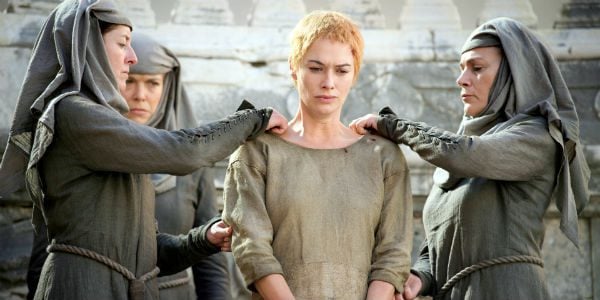I was recently invited to a premiere screening and party for HBO’s hit fantasy drama “Game of Thrones,” which premieres it sixth season on Sunday, April 24. Since I’m not a steady watcher of the show, I brought along a friend who is.
Tony Sands is the Senior Producer at Family Theater Productions — a Hollywood-based Holy Cross apostolate and TV/film production company — and a dedicated “GoT” fan. After watching the first new episode, I asked him to reflect on some aspects of it that caught my eye, but upon which I felt inadequate to comment.
Here’s what he has to say — in not too spoiler-y fashion, but you’ve been warned — on the subject of mercy, both in the Church and in the fictional world of “Game of Thrones” (with some of my photos from the event):
Yes, it is that time of year again when HBO premieres its new season of “Game of Thrones,” which launches on Sunday, April 24.
Also, if you are Catholic, or follow any of the current news about Pope Francis, you will have probably heard that the pontiff has declared this the Jubilee Year of Mercy.
So, what does one have to do with the other?
Well, what fans know that might be shocking to those who don’t watch the adult fantasy series, is that “Game of Thrones” features a significant amount of religion, and faith plays a major role in several plotlines.
Also, many of the multiple religions invented by George R.R. Martin, the author of the books on which the series is based, bear a striking and not coincidental resemblance to our religions today. To do an exact comparison is a subject big enough for another blog, but suffice it to say, one of the major faiths closely mirrors Christianity.
This belief system features one God in seven persons, and its priesthood dress similar to Franciscans. Its religious men dress in monks’ robes, and the women, in full nuns’ habits. Yeah, the comparisons are not subtle.
What makes this more interesting in light of today is that, in the show, a major plotline revolves around characters who have run afoul of the church and are being held prisoner by its hierarchy. This brings up the issue of sin, justice and forgiveness. In fact, the church leaders demand the accused characters “confess.”
All of this leads up to the issue of mercy.
To that end, here is a quick comparison of Confession and mercy as depicted in “Game of Thrones” versus how these issues are handled in reality by the Catholic Church, especially under Pope Francis.
SIMILARITIES: ““Game of Thrones” & Catholicism …
Confession: Yep, both have it. Sinners must confess their sins in order to be cleansed of their transgressions before God.
Confession to Clergy: Also similar, you cannot simply tell your sins to a friend, confidant or even God on your own for the full effects of Confession. It must be done with a priest or clergy.
Confession and the Effects of Sin: In both cases, sin causes damage to your soul but also to those around you and society in general. Sin hurts the world, and Confession heals it.
Mercy: In both, God mercy is endless and God will show mercy to all who confess.
Mercy & Penance: Sins require penance or some act of reparation. God is all merciful, but sinning still requires some means or methods of atonement.
So that means the show and the Catholic faith are the same, right?
Wrong!
The difference is mostly in how these beliefs are practiced. As is often said, “it’s all in the execution,” and regarding this issue, that “execution” might be literal.
DIFFERENCES: “Game of Thrones” vs. Catholicism …
Confession:
Catholicism: A person goes of his or her own free will, in private, and may do so anonymously. No one else is to know your sins unless you share them yourself. They are not written down or held against you at a later time.
“Game of Thrones”: Armed churchgoers may arrest you and imprison for your sins. You will be held until you go to Confession. You may also be starved, stripped, beaten and denied visitors until you confess.
Confession to Clergy
Catholicism: Confession is performed with an ordained priest or bishop and the clergy will be defrocked and excommunicated should they share your sins with anyone.
“Game of Thrones”: Confession is done with a clergyman, a septon, but usually with others there to witness and write down your sins for public record. These sins may be shared with society at large.
Confession and the Effects of Sin:
Catholicism: God is merciful. It is His single greatest attribute (St. Faustina & St. John Paul II): “I am love and Mercy Itself. There is no misery that could be a match for My mercy.” (1273, page 459).
God offers us his mercy, and He asks us to merciful in turn. Jesus says, “Let the one among you without sin cast the first stone.” (Gospel of John 8:3-10)
God’s forgiveness of us is contingent on our mercy to others. “Forgive us our sins [or “trespasses,” depending on your translation] as we forgive those who sin against us.” (The “Our Father” prayer).
“Game of Thrones”: God is merciful. People do not have to be. In fact, justice often demands severe punishment to those who sin. So God will forgive you, but people don’t have to and even if they do, the law may still demand punishment.
Mercy:
Catholicism: The sacrament of Confession almost always comes with some act of penance. Usually, this is some type of prayer asking God’s grace to make up for and heal what we cannot. We can do additional acts of penance (i.e. fasting, sacrifices, reparation) but that is between us and God.
In addition, we can do spiritual and physical works of charity (i.e. adoration, praying the rosary, giving alms) which connect us with God’s great indulgence (see Indulgences – no, we don’t sell them; yes, they’re real) which give us access to God’s mercy to take the place of the penance required because of sin.
For example, if someone does a great spiritual work like pray the Divine Mercy novena, goes to Confession during those nine days, prays for the Pope and the church, and attends Mass on Divine Mercy Sunday (the Sunday that follows Easter), he or she can gain a complete (plenary) indulgence.
This is a fancy way of saying God’s mercy and grace comes in and wipes away all the penances/punishment that the person would have had to suffer because of his or her sins.
“Game of Thrones”: Mercy is great, but justice and penance is unavoidable. Even if you confess your sins, and God forgives you and the people you hurt forgive you, the church may still chop off your head or burn you alive.
In the TV show, God may have mercy on you, but that in no way changes the punishment and penances you have to suffer because of your transgressions.
Just ask Cersei Lannister, played by Lena Heady, who is arrested by the church and imprisoned. When she finally confesses to fornication (sex outside of marriage), her hair is shaved, and she is forced to walk naked through the streets of the city with a nun ringing a bell and yelling, “shame.” The citizens are allowed to insult her, spit on her, and throw garbage at her. Yep, a little harsher than ten “Our Fathers” and five “Hail, Marys.”
Why bring this up and what does this have to do with Pope Francis? Because of three important reasons:
PUBLIC OPINION: Being that many people these days have a very negative impression of organized religion, and Christianity in general, not to mention that the majority of Catholics who don’t attend Mass regularly and go to Confession even less frequently, it should come as no surprise that many people see our faith as “Game of Thrones” portrays it.
They still see the Church as it operated in the Middle Ages. Think of how many people still attack the Church for the Crusades, which by the way, ended more than 400 years ago. They often see Pope Francis’ call to mercy as a surprising revelation when often he is simply proclaiming the mercy the Church already teaches.
And …
G.O.T. HAS ONE THING RIGHT: Note that there is an important similarity. One thing we can’t forget or deny is that while God shows abundant mercy, and God IS mercy, we must accept it. He will not force His mercy on us.
Some people say that because of God’s mercy, no one goes to Hell. That is a heresy that Jesus himself contradicts in the Bible. Why? Because God loves us and gives us free will allowing us to decide whether or not we will love Him and each other.
“Game of Thrones” actually has this part right. We must decide admit our sins and ask for, or accept, that mercy.
Pope Francis reminds us that we must go to the mercy of God and share it with others. He says, “Christians are those who let God clothe them with goodness and mercy, with Christ, so as to become, like Christ, servants of God and others.”
Last, but not least …
THANK GOD FOR MERCY! (God help a world without it!) It is great to see how merciful God is to us, and it is important to see how essential it is that we show mercy to each other.
We inherently know in our core, that the evil we commit deserves punishment. But how powerful it is to know that God, in His mercy, has given us grace to heal what is damaged by our faults?
It is equally important to know how much we can heal the world, by God’s grace, when we show mercy to others.
That is Pope Francis’ challenge to us: “Let us be loved by Jesus, let us enable the power of his love to transform our lives too; and let us become agents of this mercy, channels through which God can water the earth, protect all creation and make justice and peace flourish.”
Can you imagine a world without it? Actually, you don’t have to imagine too hard, it’s practically here – and on Sunday nights on HBO.
BONUS REASON: “Game of Thrones,” in its depiction of a Christian-like religion, actually shows us what a world is like without mercy. People are judged, ostracized, banished, arrested and, in some cases, imprisoned, not just for their actions but for what they believe.
People are put on trial for their beliefs and public apologies are demanded. Even then people are removed from their jobs or homes or punished despite these “confessions.” Does this sound familiar?
While controversial for its content, “Game of Thrones” challenges us to look at religion and how it influences us and our societies. It also examines the issues of justice, confession and mercy. In a probably unintentional way, by bringing in matters of faith, it actually shows us how terrifying a world would be without it.
In “Game of Thrones,” the noble families live by mottos such as “Lannisters always pay their debts”; or, the House of Black and White has the motto, “All Men Must Die.”
Our real life Holy Father, however, has his own motto “Love Is Our Mission.” Which do you prefer?
Images: Courtesy HBO, Kate O’Hare
Don’t miss a thing: head over to my other homes at CatholicVote and the Faith & Family Media blog, and like my Facebook page; also like the Patheos Catholic FB page to see what my colleagues have to say.



















